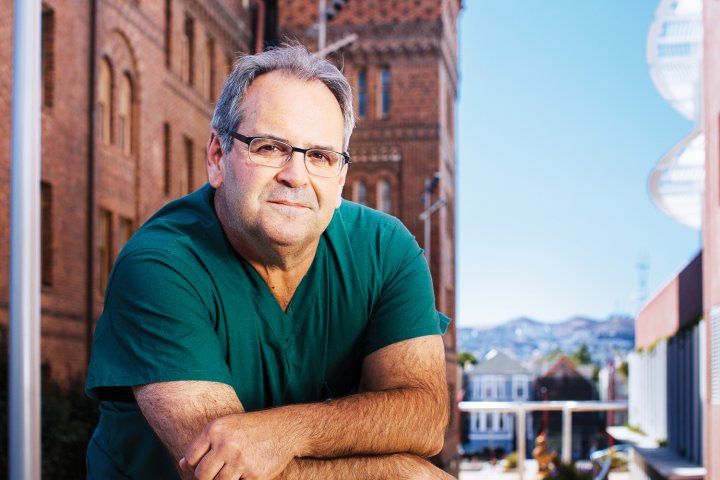Simple Blood Test Unmasks Concussions Absent on CT Scans
Pinprick to Measure Brain Protein Offers Speedy Diagnosis, Minus Radiation Exposure, UCSF-Led Study Shows
Many patients with concussion have normal CT scans and are discharged from the hospital without follow-up. But a blood test that is currently under development and costs a fraction of the price of a brain scan may flag concussion in these CT-negative patients, enabling them to be evaluated for long-term complications.
In a study led by UC San Francisco, researchers tracked 450 patients with suspected traumatic brain injury (TBI) – which includes concussion or mild TBI – who had been admitted to one of 18 level 1 trauma centers throughout the nation. The patients, whose injuries were mainly attributed to traffic accidents or falls, all had normal CT scans, according to the study publishing in The Lancet Neurology on Aug. 23, 2019.
Within 24 hours of their accidents, the patients had their blood drawn to measure for glial fibrillary acidic protein, a marker correlating to TBI. The study used a device by Abbott Laboratories called i-STAT™ Alinity™, a handheld portable blood analyzer, currently unavailable in the U.S., that produces test results in minutes.
The researchers later confirmed the blood test results against MRI, a more sensitive and expensive scan that is not as widely available as CT but offers a more definitive diagnosis of TBI. They found that 120 of these 450 patients (27 percent) had an MRI that was positive for TBI.
‘Patients with TBI Are Not Even Getting a Diagnosis’

Geoffrey Manley, MD, PhD, senior author of the study.
“Our earlier research has shown that even in the best trauma centers, patients with TBI are not getting the care they need,” said Geoffrey Manley, MD, PhD, senior author of the study, professor of neurosurgery at UCSF and a member of the Weill Institutes for Neurosciences. “Now we know that many of these patients with TBI are not even getting a diagnosis.”
Manley is also the principal investigator of TRACK TBI, which has analyzed clinical data on more than 3,300 patients and comparison participants, and previously has linked concussion with major depression, post-traumatic stress disorder and cognitive deficits. Work by other UCSF faculty has found correlations between TBI and Parkinson’s disease and TBI and dementia.
To assess the accuracy of the blood test, researchers compared the results of the patients whose CT-negative TBIs were confirmed by MRI, with a group of healthy participants as well as a cohort of patients with orthopedic injuries. They found that the average protein value of the blood samples of patients with positive MRIs was 31.6 times higher than those with orthopedic injuries and nearly 52 times that of the healthy participants. The protein was elevated even in the patients with normal MRIs, suggesting that the test may be sensitive to injury undetectable by MRI, the researchers noted.
In the future, the blood test may help clinicians decide who can safely avoid a CT scan, with the advantage of not exposing patients to radiation from a CT, said first author John Yue, MD, of the UCSF Department of Neurological Surgery. Additionally, the blood test may be a useful tool for those patients in trauma centers and emergency departments, whose symptoms may be altered by substance use, he said. “Patients with concussion may present as confused and disoriented, and may repeat themselves – symptoms that are similar in people with intoxication. With the blood test, we may be able to discern whether their symptoms are primarily due to brain injury and treat accordingly."
The blood test may also clarify diagnosis in patients with co-existing conditions or those who take medications that may impact speech and behavior, said Yue.
“These blood-based biomarkers are the next step in the evolution of diagnosing and treating TBI,” said Manley. “We are finding that not only are they more sensitive than CT in identifying TBI, but they may be more accurate than the current standard of MRI.”
The study follows an earlier TRACK-TBI pilot study that found approximately 30 percent of concussion patients with negative CTs and positive MRIs had disability three months post-injury.
Co-Authors: Co-authors are from UCSF; Zuckerberg San Francisco General Hospital and Trauma Center; University of Michigan, Ann Arbor; University of California, San Diego; Mayo Clinic, Rochester; University of Pittsburgh Medical Center; University of Florida, Gainesville; University of Pennsylvania, Philadelphia; and TRACK-TBI investigators. For a complete list of authors, please see the study online.
Funding: The study is supported by funding from the National Institute of Neurological Disorders and Stroke, and the U.S. Department of Defense. The authors report no conflicts of interest.
The University of California, San Francisco (UCSF) is exclusively focused on the health sciences and is dedicated to promoting health worldwide through advanced biomedical research, graduate-level education in the life sciences and health professions, and excellence in patient care. UCSF Health, which serves as UCSF’s primary academic medical center, includes top-ranked specialty hospitals and other clinical programs, and has affiliations throughout the Bay Area.